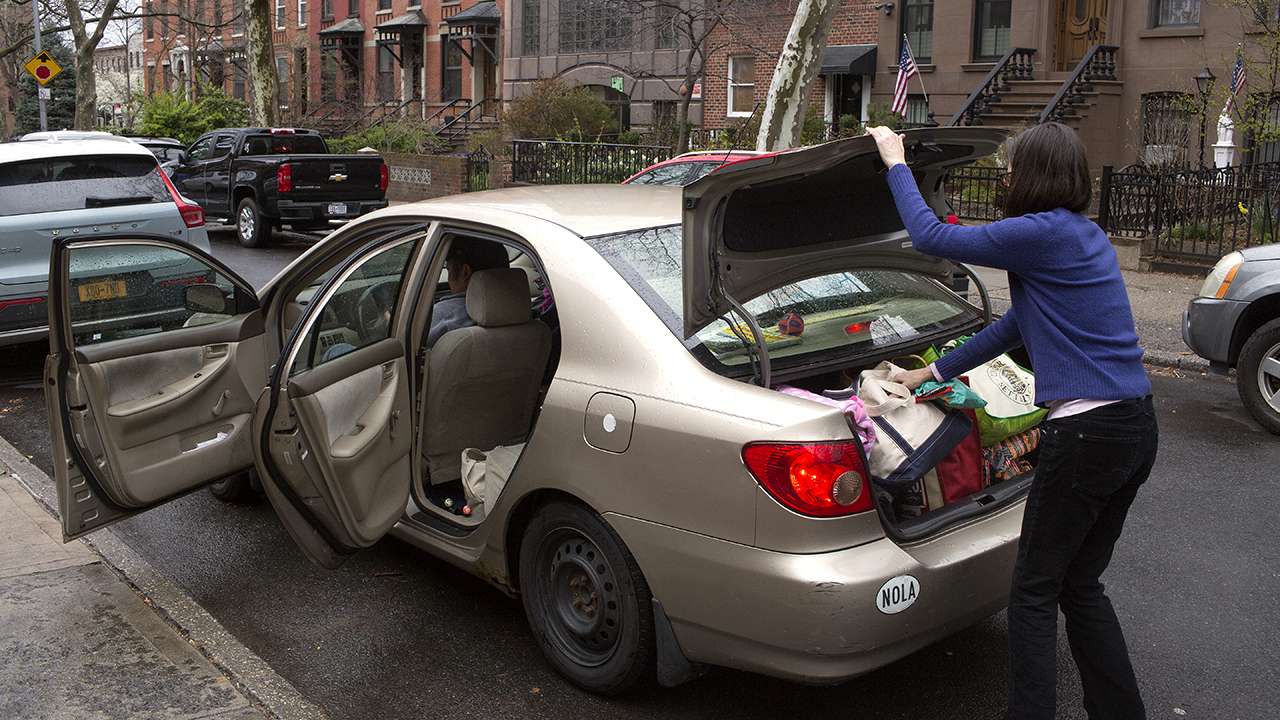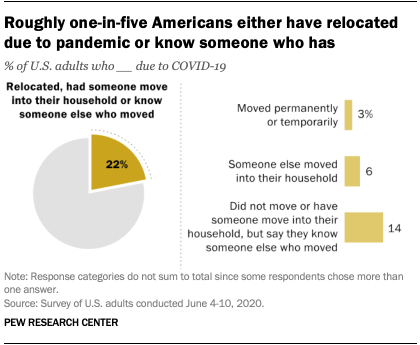
Millions of Americans relocated this year because of the COVID-19 outbreak, moving out of college dorms that abruptly closed, communities they perceive as unsafe or housing they can no longer afford. Overall, around one-in-five U.S. adults (22%) say they either changed their residence due to the pandemic or know someone who did, according to a new Pew Research Center survey.
Among those surveyed in early June, 3% say they themselves moved permanently or temporarily due to the coronavirus pandemic, and 6% say someone moved into their household because of it. (Some had more than one of these things happen.) An additional 14% of those who did not personally experience relocation say they know someone else who moved.
Experiences with coronavirus-related relocations vary by demographic characteristics. The age group most likely to have had at least one of these things happen to them are the nation’s young adults: Overall, 37% of those ages 18 to 29 say they moved, someone moved into their home or they know someone who moved because of the outbreak. By race and ethnicity, 28% of Hispanics have had one of these experiences, compared with 20% of white adults, 19% of Black adults and 24% of Asian Americans.
Pew Research Center conducted this study to understand the extent to which American households and lives were disrupted because people relocated due to the nationwide coronavirus outbreak. This analysis was based on 9,654 U.S. adults. The data was collected as part of a larger survey conducted June 4-10, 2020. Everyone who took part is a member of Pew Research Center’s American Trends Panel (ATP), an online survey panel that is recruited through national, random sampling of residential addresses. This way nearly all U.S. adults have a chance of selection. The survey is weighted to be representative of the U.S. adult population by gender, race, ethnicity, partisan affiliation, education and other categories. Read more about ATP’s methodology.
Here are the questions used for this report, along with responses, and its methodology.
Educational attainment and income also are linked to the likelihood that a person moved due to the outbreak or knows someone who did. For example, a higher share of adults with a bachelor’s degree (28%) than those without one (18%) say they moved because of the coronavirus or know someone else who did.
These are among the findings of the survey, conducted among 9,654 U.S. adults from June 4 to 10, 2020, using the Center’s American Trends Panel.
Who moved due to COVID-19, and for what reasons?
Around one-in-ten adults ages 18 to 29 (9%) say they moved due to the coronavirus outbreak, higher than the share in any other age group. Young adults are among the groups most affected by pandemic-related job losses and by the shutdown of college housing in early spring.
By race and ethnicity, Asian and Hispanic adults are more likely than white adults to have moved due to the outbreak, with 7% of Asian adults and 6% of Hispanic adults saying they did, compared with 2% of whites.
Among U.S. adults who moved due to the pandemic, 28% say the most important reason was to reduce their risk of contracting the virus, which has infected more than 2.8 million Americans of all ages. Another 23% say it was because their college campus closed, and 20% say they wanted to be with family. An additional 18% say the most important reason was financial – either job loss (8%) or another money-related reason (10%).
Survey respondents who did not select one of these reasons gave a variety of other reasons for moving. One said, “I am traveling and am now blocked from returning home.” Another wrote: “Needed more space to work from home.” And a third said, “Recalled to active duty for military’s COVID response.”
Around six-in-ten (61%) of the adults who moved say they relocated to a family member’s home. That included 41% who moved in with their parents or in-laws; 4% who moved in with an adult child or in-law; and 16% who moved in with another relative. For 13% of those who relocated, their destination was a second home or vacation home. An additional 7% moved in with a friend. Some movers relocated to temporary homes, apartments or hotel rooms (7%), while others acquired a new permanent home (9%) by rental or purchase.
Among those who did not select one of these categories, one respondent said: “Moved back to main home from vacation home.” Another wrote: “I normally split my time between two locations. Now staying in one with less risk.” And a third explained: “Back to the States, I was abroad because of work.”
Who moved in due to COVID-19?
Young adults (10%) are the most likely age group to say someone moved into their household for coronavirus-related reasons. By race and ethnicity, Hispanic adults are more likely than white or Black adults to say that someone moved into their household due to the pandemic – 9% say this, compared with 5% of white and Black Americans. Meanwhile, 8% of Asian Americans say someone moved into their household.
Most people who had someone relocate into their household say it was a family member who did. For 47% of Americans who had someone move in, a new arrival was an adult child or spouse of an adult child, and for 18% it was a parent or in-law. About a quarter (26%) say a friend moved in and 17% say a romantic partner did. (The total adds to more than 100% because some Americans had more than one person move in. Also, respondents were asked only about these four categories of adults.)
Demographic differences in knowing someone else who has moved
As is true of those who moved or had someone move in, young adults are more likely than people in other age groups to say they know someone who relocated due to the coronavirus. (Only those adults who did not move or have someone else move in were asked whether they know someone else who did.)
Of those who did not move or have someone move in, about a fifth (22%) of young adults know someone who relocated, compared with only 9% of adults ages 65 and older.
Education and income also play a role in the likelihood of knowing another person who moved. In general, those with more education and higher incomes are more likely to know a pandemic-related mover. Around a fifth (21%) of adults with annual household incomes of $150,000 or more say they know someone who moved due to the coronavirus outbreak. That compares with 14% of those with annual incomes below $30,000.
About one-in-five adults with at least a bachelor’s degree (19%) say they know someone who moved, about double the share of those with a high school education or less (9%) who say so.
Note: Here are the questions used for this report, along with responses, and its methodology.
CORRECTION (Jan. 13, 2021): In a previous version of this post, the final three charts were labeled with incorrect age ranges for two groups. The data for the middle two age ranges is for ages 30-49 and 50-64. The figures in the charts and text have not changed.







